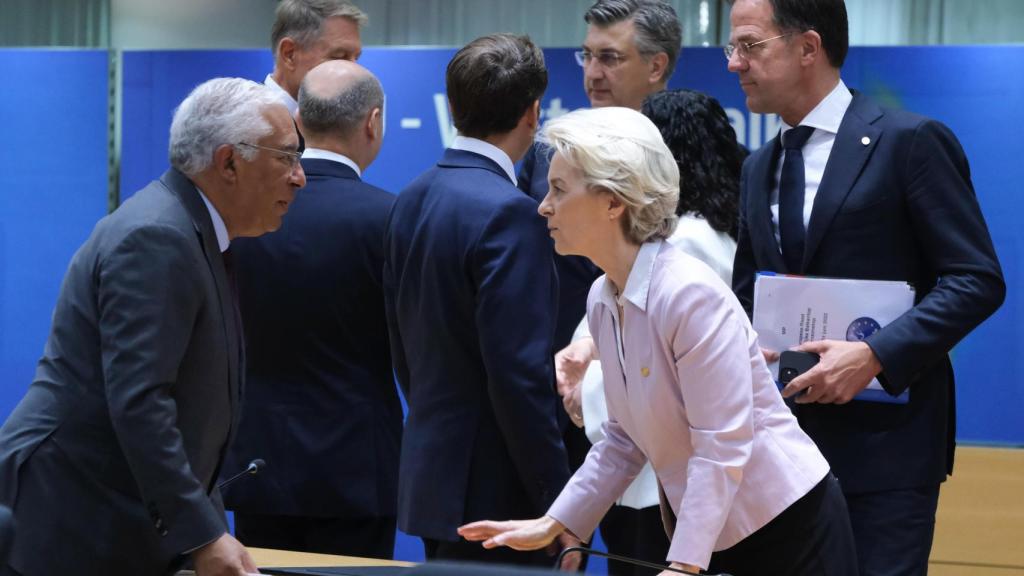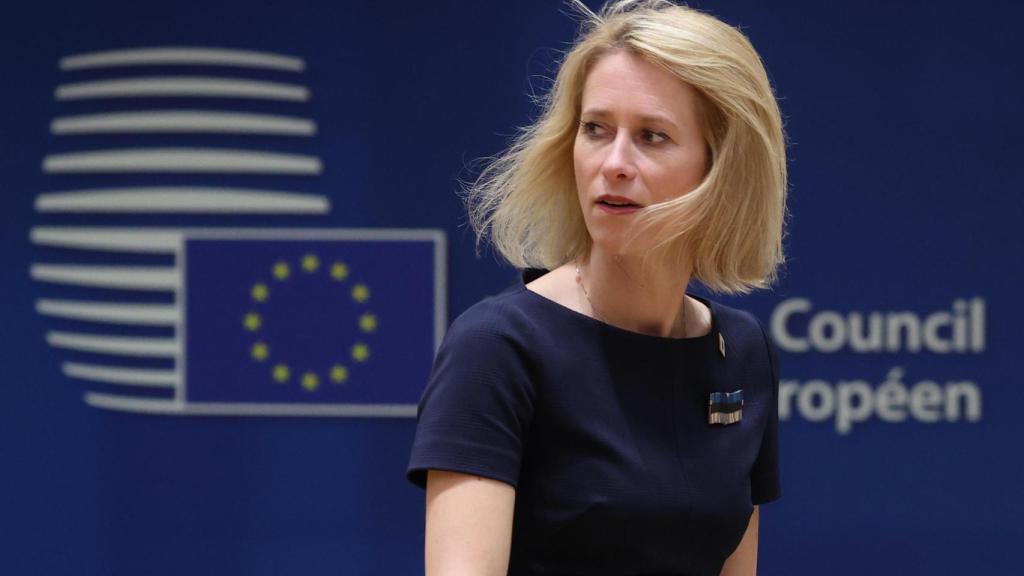The trio formed by Ursula von der Leyen, António Costa and Kaja Kallas, elected this Thursday by European leaders to govern the EU during the 2024-2029 legislature, respects all the complex balances that requires the distribution of senior positions, starting with gender equality. Even so, he has not had the support of the Italian prime minister, Giorgia Meloninor from Hungarian Viktor Orbán.
Von der Leyen comes from a large Central European country and is the candidate of the European People’s Party, winner of the 9-J elections. Costa has been nominated by the socialists and represents the countries of the South. He is also the first person of color to reach the top of the EU. For his part, Kallas belongs to the liberal family and will be the voice of the Eastern countries and small countries.
Ursula von der Leyen, Mrs. Europe
Since he came to power in 2019, there are no longer doubts about the phone number to call to speak with the EU. Ursula von der Leyen (Brussels, 65 years old), the first woman president of the Commission, has become in the face of Europe in the last 5 years. His first term has been marked by a succession of crises: Covid-19, the war in Ukraine, the energy emergency or the conflict in Gaza. Unprecedented turbulence that at every moment was on the verge of burning her, but from which she has managed to emerge stronger.
Her post is by far the most important in Brussels. The European Commission is the closest thing to the EU government, with the power to initiate legislation and the obligation to enforce the Treaties. In her first term, The German has also centralized all power and he has hardly shared any time with his team of commissioners, which has earned him criticism from his colleagues. The rearmament of the EU against Russia and the reinforcement of economic competitiveness are the two main priorities of the new legislature.
Daughter of a senior European officialVon der Leyen lived the first 12 years of her life in Brussels. She began her university studies in economics but after three years switched to medicine, in which she obtained her doctorate in 1991. Married with seven children, von der Leyen revolutionised Germany’s birth policy during her time as Minister for Family and Youth Affairs in Angela Merkel’s first cabinet in 2005. She increased the number of childcare places and introduced 14 weeks’ paternity leave.
Ursula von der Leyen, President of the Commission, opens the weekly meeting of the College of Commissioners, in Brussels.
In 2013, Von der Leyen became the first woman to hold the defense portfolio in Germany, also under Merkel. In this department her popularity plummeted when she became involved in several scandals. In July 2019, Emmanuel Macron proposed her by surprise to succeed Jean-Claude Juncker at the head of the Commission, after all official candidates were ruled out.
Everyone in Brussels recognizes his prominence in the design of the Next Generation funds, which allowed Italy and Spain to be saved in the midst of Covid-19. Or his firm response to Russia’s invasion of Ukraine. However, Von der Leyen caused controversy for his visit to Israel after the Hamas attacks for providing unlimited support to the Government of Benjamin Netanyahu. Or also for his concessions in the face of farmers’ protests, withdrawing a central piece of the European Green Deal, such as the law to reduce the use of pesticides. The President of the Government, Pedro Sánchez, boasts of having had an “extraordinary relationship” with her.
Antonio Costa, the reborn
The political career of Antonio Costa (Lisbon, 62 years old) seemed to have reached a abrupt end on November 7, 2023That day, Costa resigned as Portuguese Prime Minister following a judicial operation that resulted in 42 searches and the arrests of his chief of staff and a businessman friend. His name appeared involved in an investigation related to influence peddling, corruption and prevarication in energy projects.

António Costa talks to Ursula von der Leyen during a meeting of the European Council in Brussels
At that time he was already the favourite to succeed Charles Michel at the head of the European Council, but suddenly disappeared from all the poolsHe has always maintained his innocence and claims that he resigned to preserve the “dignity” of the office. Over time, the case has fizzled out and Costa is no longer charged with anything. What’s more, it came to light that prosecutors had confused his name with that of the Minister of the Economy, António Costa Silva, in the transcripts of the wiretaps.
This has allowed him to be reborn from his ashes and return triumphantly to the front line of the European scene, hailed as the only candidate of the socialists for the distribution of senior positions. Not only that: the new Portuguese prime minister, the Christian Democrat Luis Montenegrowho also supports him wholeheartedly despite being from a rival political family. During the last legislature, Costa – whose father was half Mozambican, half Indian – has been a close ally of Pedro Sánchez in Brussels, on issues such as the ‘Iberian exception’.
“All leaders like António Costa“, a European diplomat said a few days ago. His communicative and good negotiating talent is perfectly suited to the role of President of the European Council, which has no executive powers and whose main task is to “facilitate cohesion and consensus” between European leaders, act as intermediary and pave the way for agreements. In certain cases he also assumes the external representation of the Union.
Married with two children and a trained jurist, Costa began his political career as a deputy in the Portuguese Parliament in 1991. As he rose in the Socialist Party, he joined successive governments as a minister, first with Antonio Guterres (Parliamentary Affairs and Justice) and then under the leadership of Jose Socrates (Interior). With his popularity on the rise, Costa left the government in 2007 to move to Lisbon, where he was elected mayor three times in a row (2007, 2009 and 2013), each time with a larger majority.
In the 2015 elections he was the Socialist Party candidate for Prime Minister. Despite losing the election to Christian Democrat Pedro Passos Coelho, Costa managed to form a coalition government with the Left Bloc and the Communist Party. The so-called pact of the Geringonça It continued for a second term, until Costa won an absolute majority in 2022.
In addition to his eight years as a member of the European Council, Costa has extensive experience in the EU. He was an MEP and vice-president of the European Parliament between 2004 and 2005, and has even participated in the Committee of the Regions during his time as mayor.
Kaja Kallas, the new iron lady
Kaja Kallas (Tallinn, 46 years old) has been the latest addition to the puzzle of EU senior officials. The Prime Minister of Estonia, nicknamed the ‘Europe’s new iron lady’who wanted to be NATO Secretary General, was rejected because of her “excessively” harsh line towards Russia.

The Prime Minister of Estonia, Kaja Kallas, during the European Council this Thursday in Brussels
Her role as High Representative will be to forge consensus and represent the common position of the EU, where there is one. Ultimately, foreign policy remains in the hands of the Member States and any movement in the EU requires unanimity. In any case, some Member States are still concerned that Kallas dedicates all his time to the eastern flank and neglects other priorities such as the southern neighborhood or relations with Latin America.
Since Putin unleashed his war against Ukraine on February 24, 2022, the young and dynamic prime minister has become one of the strongest and most influential voices in the EU and NATO in favor of the supply of weapons to Ukraine and the tightening of sanctions against Russia. A kind of leader of the European resistance to Moscow’s aggression, despite the fact that his country barely has 1.3 million inhabitants. His perfect English and his mastery of social networks have allowed him to multiply his presence and popularity in the media of all EU countries.
Her father, Siim Kallas, is one of the architects of Estonian independence. Kaja Kallas studied law and economics and became a lawyer. She began her political career as a national MP in 2011 and then won a seat in the European Parliament in 2014. In 2018 she rose to the leadership of the Estonian Reform Party, which belongs to the family of European liberals. In 2021 she became the first woman to become Prime Minister of Estonia in a coalition government. A position that he revalidated in the last elections in March 2023.
Since coming to power, Kallas has increased defence spending to 3% of GDP (Spain’s only 1.26%) and has also announced a specific allocation of 0.25% for military assistance to Ukraine over the next four years. As Estonian prime minister, she has asked the rest of her partners to do the same.


![[Img #74664]](https://thelatestnews.world/wp-content/uploads/2024/12/James-Watson-The-controversial-genius-behind-the-double-helix-150x150.jpg)










Add Comment